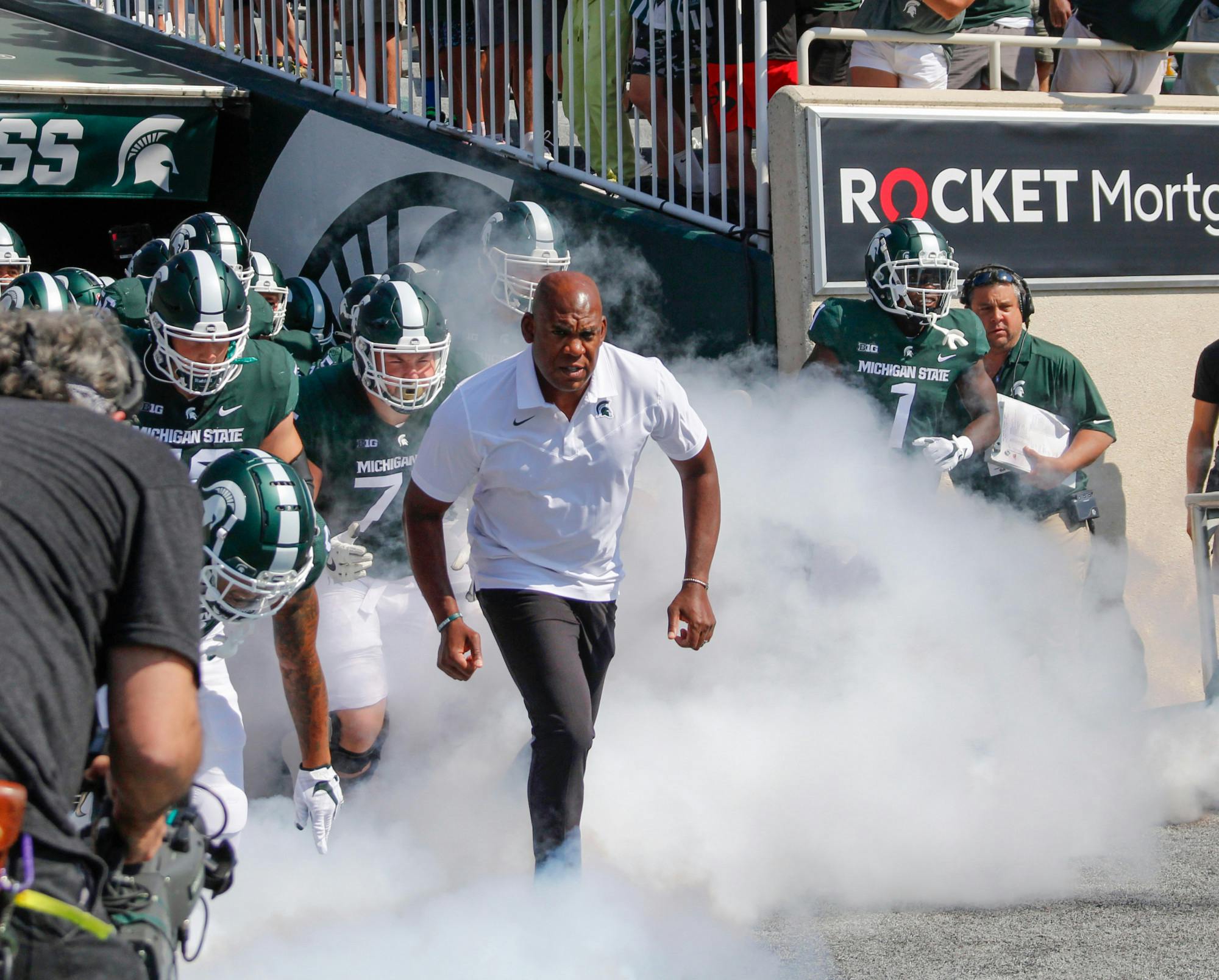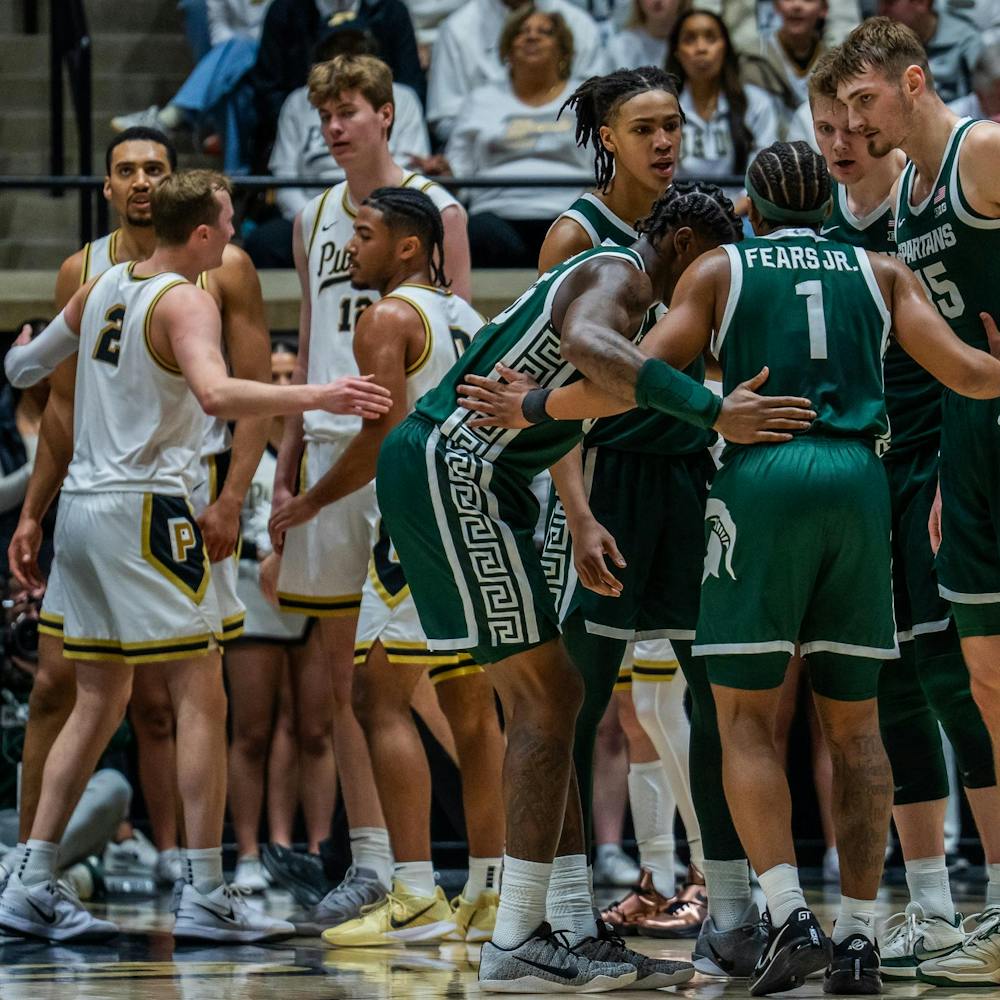Plateau cannot be located in Michigan State Football Head Coach Mel Tucker’s vocabulary, especially when talking about his Michigan State football team.
Under the direction of Tucker in his second year at the helm, Michigan State surpassed all expectations on their way to an 11-2 record and a New Year’s Six victory. The triumphs earned the program its first 10-win season since 2015 and Tucker a lucrative $95 million extension for the next decade.
On the backs of new faces on offense and key plays all year from the defense, Michigan State emerged as one of the true surprises of the 2021 college football landscape. And behind the players that were making it happen on the field was Tucker, the even-keeled and intense coach who was bearing the fruits of his labor in establishing the long-term goals he had for MSU.
Tucker said while the team did make significant steps in the right direction last season, there is still a long way to go in terms of the ultimate goals for MSU of winning championships.
“Of course it can be attained, but it's not going to be easy,” Tucker said. "It's gonna take a lot of hard work.”
Michigan State enters the 2022 season at a crossroads between two very distinct paths, much like last season. Last year, MSU was between embracing Tucker’s culture and chip-on-the-shoulder mentality and falling into a pit of despair again like in 2020. MSU trended towards the former and the dividends have MSU set up to take yet another step this offseason.
MSU is still on the outside looking in in terms of competing for a Big Ten or national title but the seeds were planted in the fifth-best season in program history. MSU is a program moving in full force forward towards their perceived goals, all while embracing the mantra of the coach that lifted them out of the weeds.
But how exactly do the Spartans make up ground going into 2022? There is no Kenneth Walker III to splice apart defenses like a well-trained surgeon, and the grizzled experience from the offensive line is long-gone.
Well, according to Tucker, the program is in a much better place than it was a year ago but work still needs to be done. To him, the only path forward is if everyone gets better and lives by one of the program mantras of the ‘attribution of marginal gains.’
“We're just working to get better every day,” Tucker said. “The aggregation of marginal gains, it’s every single guy just getting a little bit better every single day, and focusing on the process. And so far, the attitude has been good.”
The mantra may seem corny or just coach talk, but repetition of the same slogans from Tucker is a sign of his culture taking a firm hold.
“The players are listening and they understand what we're saying — they understand the message,” Tucker said. “It's just not words on the wall or slogans. For them to be able to kind of give it back to us or repeat it to you, that means they actually understand it. And then they understand the context and what it means and when it should be applied.”
The mindset extends past the players into the coaching staff too. While asking the players to improve individually in any way they can on a daily basis, Tucker and his assistants have scoured the country to bring in talented players that fit into what Tucker is trying to build.
This effort led to MSU reeling in the 22nd-best recruiting class in the country as well as adding high-profile transfers on both sides of the ball like defensive end Khris Bogle and running back Jalen Berger.
“We have more guys that are capable of having significant roles,” Tucker said. “There's gonna be a lot of competition to get on the field, which is good. It's gonna make everyone better.”
The most patchwork MSU will have to do from last year’s team will be on the offense. The Spartans are losing key contributors in Walker and Connor Heyward, who are taking their talents to the NFL. MSU also lost a lot of muscle at the point of attack with the subtraction of AJ Acuri, Matt Allen, Luke Campbell and Blake Bueter on the offensive line.
The losses could negatively impact MSU’s resurgent running game which was the lifeblood of the offensive renaissance MSU experienced last season. On the back of Walker’s Doak Walker campaign and solid offensive line play, Michigan State had its best offensive season since 2014, averaging 31.8 points and 429.3 yards per game, both of which were program bests by a large margin over the last seven seasons.
Regression could be expected, but Tucker is expecting another step from redshirt junior quarterback Payton Thorne, who came into his own as a passer and leader in his first year starting under center. There is a collective belief among the Spartans that the offense will continue to thrive as long as Thorne continues to come into his own as the leader both on and off the field to lift the new faces up around him.
The addition of Berger as well as the continued improvement of returning running backs like junior Jordon Simmons, senior Elijah Collins and redshirt freshman Davion Primm will help maintain balance offensively, but the collective belief is that it's Thorne’s turn to handle the reins of Johnson’s offense.
“I think one of the big emphases for me is to get Payton Thorne to even play at a higher level,” Johnson said. “He was really really good last year, he was very solid, but I still think, as he and I have reviewed things and he and I have talked, the growth for him I think is really there still.”
Support student media!
Please consider donating to The State News and help fund the future of journalism.
The place where the Spartans are primed for the most improvement is on the other side of the ball. Michigan State had an up-and-down year defensively, bucking the recent trend in MSU history, and had to rely on the offense most of the time in crucial games. The Spartans ranked a modest 54th in the country in points allowed (25.23 per game) but ranked dead-last in passing defense (324.8 passing yards allowed per game).
Inconsistencies on defense were largely masked by the team’s success offensively but proved to be the team’s achilles heel on multiple occasions, prompting Tucker to overhaul parts of the defensive staff and bring in lots of transfers at every level of the defense.
MSU hired Brandon Jordan, a private defensive ends coach for NFL players, to be the team’s pass rush specialist to work alongside Marco Coleman, who left Georgia Tech to join be MSU’s defensive line coach.
Jordan’s presence has been widely felt in his short two months with the program. From the parade of current NFL defensive linemen in the Duffy Daugherty building for his private training to his actual coaching prowess, the praise for Jordan has been continuous.
“He (Jordan) and coach Coleman working together — that's a strong tandem there and very good coaches but I like what I've seen so far,” Tucker said. “He's a teacher and the players, they're listening. He's captured their attention.”
Behind the front four, MSU has looked to improve through the transfer portal. Jacoby Windmon and Aaron Brule have been added to the linebacking corps and Ameer Speed was brought in to beef up the cornerback room with championship experience after winning it all with Georgia last season.
The pieces have been put in place and the work has begun to try to build on last year’s season. That is music to Tucker’s ears because unless the season ends with a trophy on his mantle, he is not satisfied. But after spending the better part of two years righting the ship, Tucker believes the team’s path is bright.
“It's a work in progress but I really like the direction that we're headed.”
Discussion
Share and discuss “MSU football looks to take another offseason stride through marginal gains” on social media.







